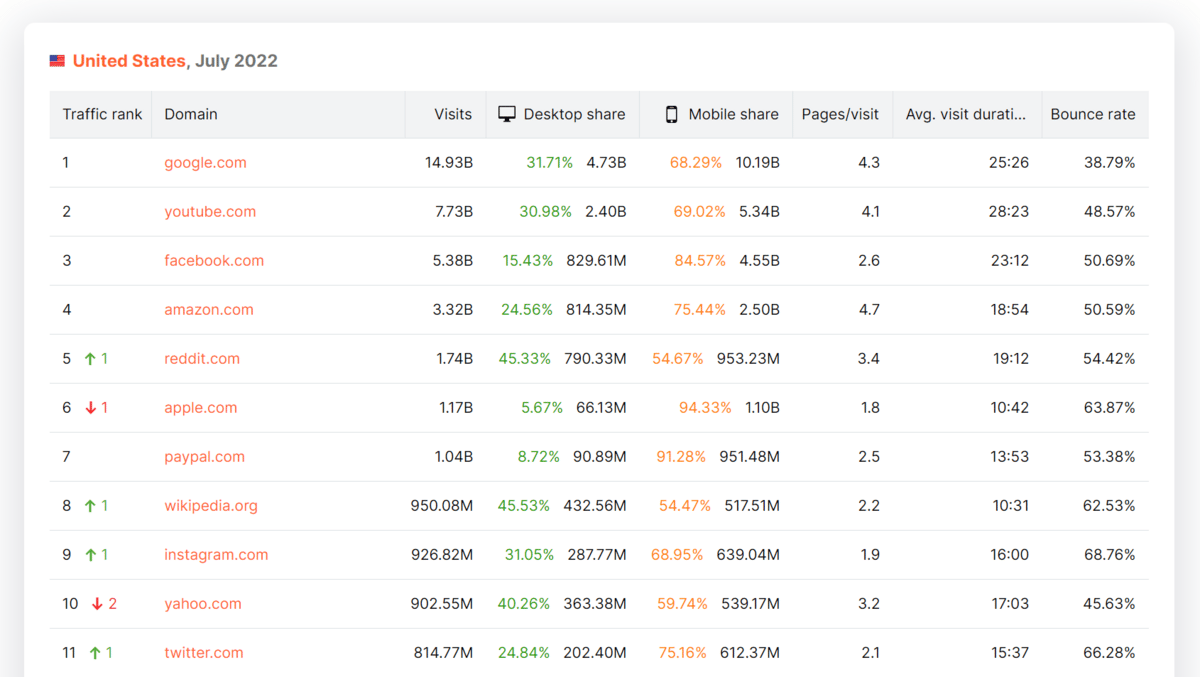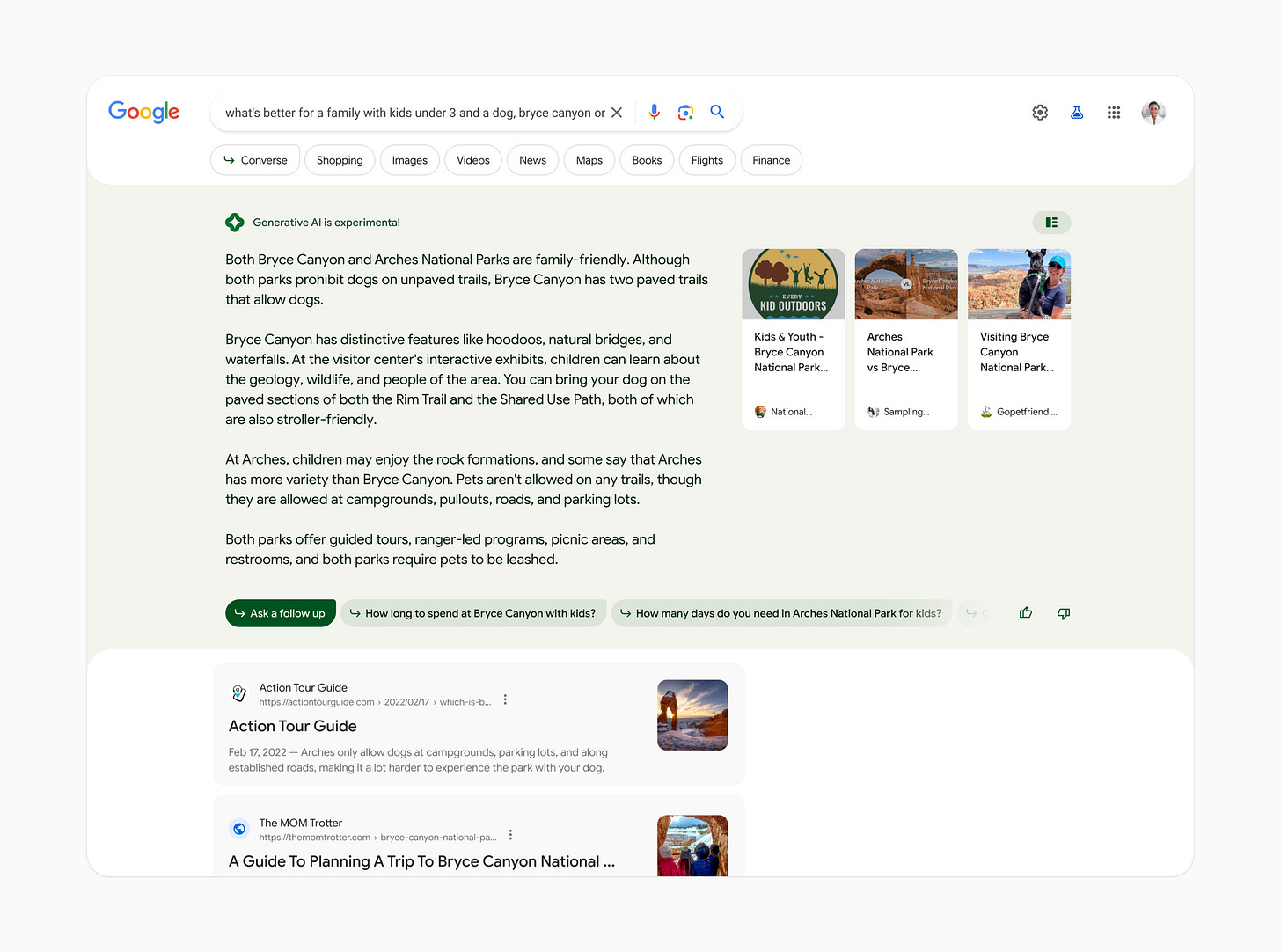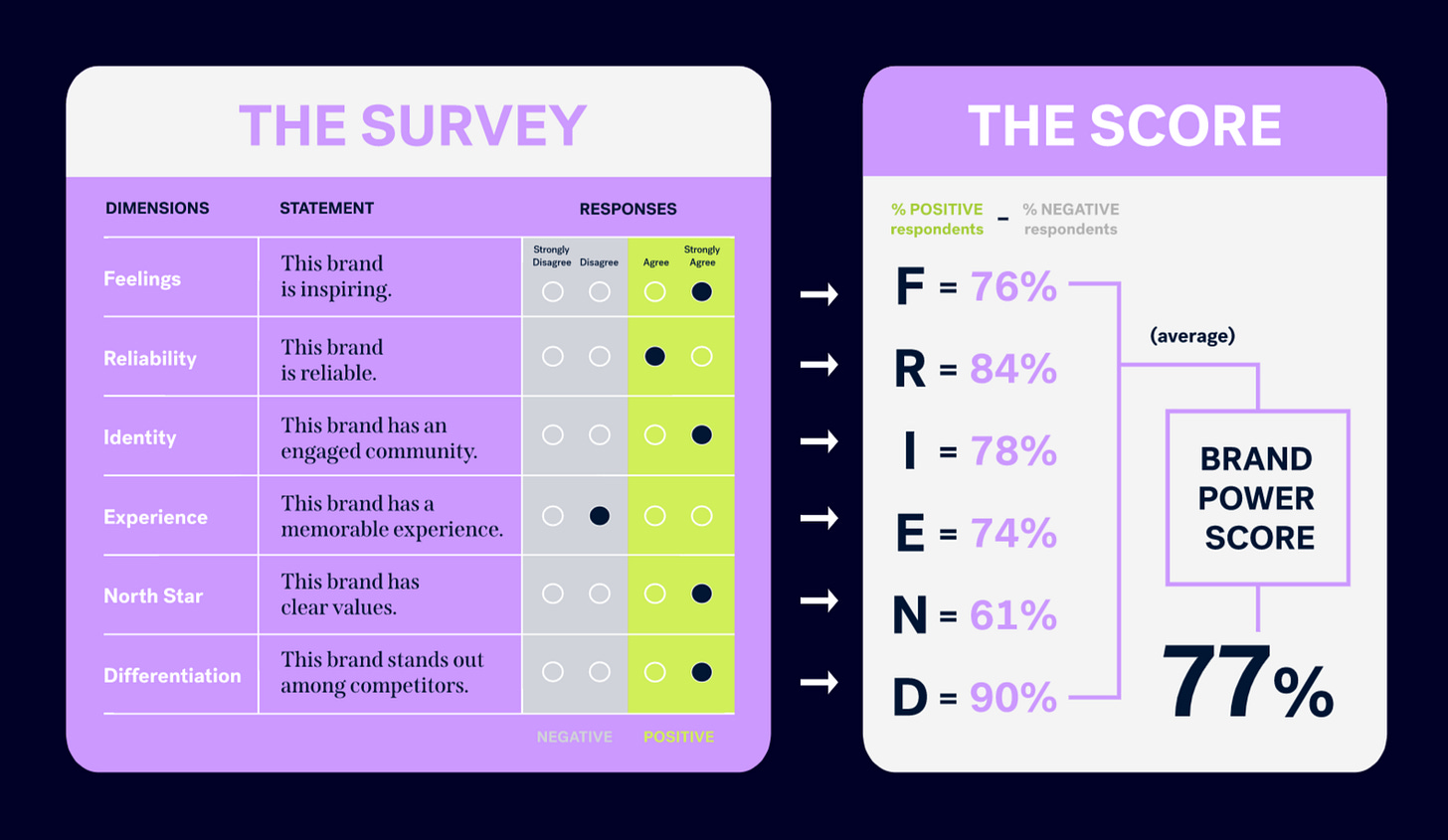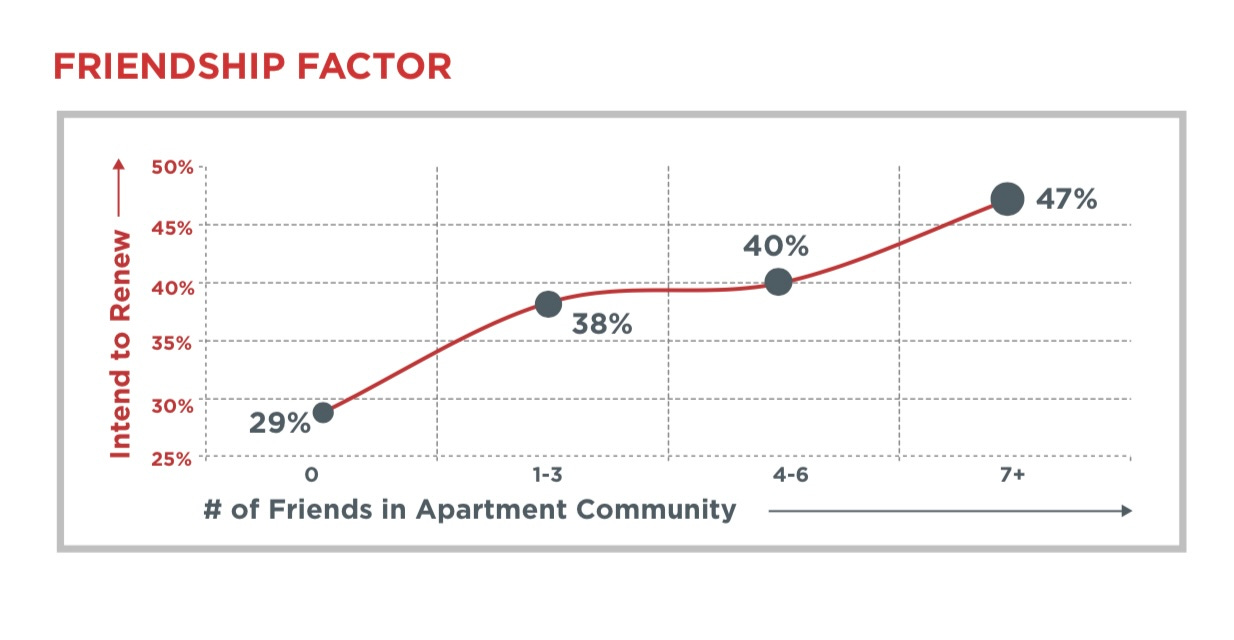🍌 Google's For You Page, Part 2
A second look at how Google's products are changing. Plus, Forerunner's Brand Power Score, Sweetgreen's automated kitchen, and 600 years of interest rates.
Hi everyone 👋 Turner back again with The Split.
If you missed it, last week I wrote about why AngelList’s internal data tells us your venture investments probably aren’t getting marked up.
A few months ago, I wrote about Google’s “For You Page” (an ode to TikTok’s For You Page), and how its main search products were changing. Last week Google hosted its 2023 I/O event, revealing even more of its product road maps, and specifically its plans around generative AI. This gives us much more clarity around how its products will change. I think it’s relevant not just for consumers, but for anyone who’s business relies on Google (which is most of them).
Quick housekeeping before jumping in, if this isn’t hitting your inbox after the move to Substack:
Gmail: Move to your primary inbox. On mobile: Hit the 3 dots (...) at the top right corner of the app, click "Move to" then "Primary". If you don't see Primary, you're already set. On desktop: Back out of this email, drag & drop this email into the "Primary" tab on the top left of the screen.
Apple Mail: Tap on my email address at the top of this email (next to "From:" on mobile) and click "Add to VIP".
For everyone else: Follow these instructions.
A Message From Safara
🏨 Get 10% Cashback on Hotel Bookings
Safara is a Sequoia-backed hotel booking platform giving you 10% back at over 1 million hotels globally. Why do people book with Safara?
10% back on every booking with no restrictions, blackout dates, or hidden fees
Automatic carbon offset for 100% of bookings at no extra cost
Curated list of the top 1% of hotels
24/7 in-house customer service
At first, I was skeptical of yet another hotel booking platform. But I’ve been using Safara for a few months, and it’s nice having what feels like a friend recommending all the best hotels in each city. And it shares 10% of the commission it gets from hotels as cashback, which is a clever way to keep us hooked. I’ve been thinking of it as “Stay 10 nights, get the 11th night free”.
My friend Michelle at Safara is giving readers of The Split a special offer. The first 50 people to book through this link will get $75 towards their first stay (promo code = thesplit).
Google's For You Page, Part 2
In October, I wrote about how Google’s home page was going to change dramatically.
Google and YouTube are the most visited web pages on the internet…
According to Semrush, Google.com is the most visited web page on the internet, followed by YouTube. In fact, these two’s 22.6 billion daily visits are more than the next nine most visited web pages combined.
(This is of course not a perfect comparison since many of the lesser ranked pages have apps with lots of traffic. Google itself also controls the most popular mobile operating system in Android, and has a significant amount of traffic through products like Chrome and the YouTube app.)
…and yet the core functionality of Google Search, and even Chrome and YouTube, hasn’t changed much in decades. But Google started planting the seeds that changes were coming, and this was before the world discovered ChatGPT and generative AI.
At the time, Google gave examples of search evolving by sourcing relevant links, images, and videos directly within search results. It’s progressively started doing this over the last few years, but its always still been heavily text-based.
Google hosted it’s I/O 2023 event last week, showcasing everything its working on (here’s a good event recap from The Verge). It’s not hard to imagine what new features Google can add with things like conversational and generative AI.
The first obvious application of generative AI is chat. Or as Google is calling it, Search Generative Experience. Similar to ChatGPT, Google will give chat-based responses in search results. It will have to balance this with its existing ad-based business model in which advertisers pay to be placed at the top of search results. But even in early iterations like the image below, its sourcing three external links alongside the text response. It’s not a stretch for Google to start charging for that placement. And it’s very unlikely it ever gets directly into commerce itself, meaning it will still need to link out to third parties that actually facilitate transactions, the same third parties that have historically relied heavily on traffic from Google.
One other tangible example it gave was “Perspectives”. If you’re like me, you use Google to search other websites. You can do this by adding “site:reddit.com” to the beginning of a search, or just throwing “reddit” at the end (if you haven’t used Google to search Reddit before, it’s a gamechanger).
Google is productizing this behavior and bringing it directly into search results. Perspectives will further integrate user-generated content like YouTube videos, Reddit comments, Quora answers, and more. Google specifically mentioned Perspectives would focus on actual human-generated content, a nod to fears that AI-generated content optimized for SEO is going to overrun search results. But that also may help Google’s results stay relevant with fresh, relevant content in a world where upstart generative search tools rely on models trained existing, historical content.
One last feature we might see is Google using generative AI to create alternative photos or videos related to a search. If someone is shopping bomber jackets like in the example above, Google could take a single photo from Nordstrom.com and create a 30 second video showcasing the product from various angles, and even on different sized models. It might sound wrong for Google to manipulate how the result for a jacket shows up in search. But Google has already done this since the beginning: right now, the results it shows us are text and images that look completely different from the web pages the results link to. It’s just taking the next step to further improve its own results.
Generative AI is certainly something Google’s thinking about. Here’s 15 seconds of Google CEO Sundar Pichai saying “generative AI” non-stop”:
Google is adamant generative AI will only appear when it thinks it will be more useful than its standard search results. And it says it will avoid using it around sensitive topics like finance and health. But it does see generative AI as fundamental long-term change to search, which will improve both how we search and how we view the results.
Personally, I think nailing the integration of "generative search” and “predictive search” will be an artform Google will have to learn over time. It probably won’t keep the upstarts at bay, but Google stands to be a big beneficiary of AI regardless of if or how many startups are successful.
From the perspective of a founder or any business leveraging Google for traffic, generative AI could completely change how Google’s search ranking works. Similar to the opportunity that exists in TikTok SEO, there will probably be a window to capitalize on all Google’s changes before the rest of the world realizes.
The massive internet platforms will probably capture the majority of the aggregate market cap added by AI. But they’ll create numerous opportunities for other companies and startups to build defensible businesses on top of them.
🚀 Product Launches
OpenAI Plugins Leave Alpha: Speaking of upstarts, ChatGPT Plus users now have beta access to 70+ third-party plugins. This allows ChatGPT to browse the internet, turning it into its own ecosystem. The question now is what does OpenAI build after this? And how does Google react?
Airtable Launches AI-Enablement: Founder Howie Liu describes Airtable’s hybrid spreadsheet / database as a Lego kit, and incorporating AI across its product line adds another Lego piece. Airtable has become a popular way to spin up websites, forms, and other tools without any code. Last year it rolled out capabilities allowing customers to build apps on top of Airtable, and these new AI features should expand those use cases further. AI ultimately just distills software down to text and words, and Airtable’s core product is text-based spreadsheets. I can imagine the convenience of turning a simple spreadsheet into a full-fledged website within seconds using the power of ✨AI✨.
Forerunner’s Brand Power Score: A brand can often the most powerful thing a company has, but it’s usually the hardest to measure. Forerunner put together a framework for doing so, plus this analysis of 100 well-known brands that placed Harley Davidson (!!) at #1.
Sweetgreen’s Infinite Kitchen: This new automated restaurant in Chicago can fulfill orders within five minutes. The announcement comes two weeks after unveiling its new subscription, Sweetgreen+. For $10/month, consumers get $3 off each order, which pays off if a customer orders at least four times per month. As a daily Snackpass user, it’s incredible ordering from my phone as I’m walking to a restaurant, and skipping the line to a finished order that’s ready to go when I walk in the door. I’d expect to see Sweetgreen’s automation experiments intersect with similar features.
I’m personally very interested to see how Sweetgreen’s combination of subscription and automation evolves over time. How many subscribers can Sweetgreen+ scale to? Does it ever make sense to open its app or automated facilities to other merchants? Or should Sweetgreen launch other (automated) restaurant brands? And maybe, focusing on salads alone are simply the biggest opportunity?
🔗 News and Charts
Historical Software IPO Forward Revenue Multiples: At first glance, it looked like the highest forward multiples also ended up performing the best over time (Workday at 18x, Veeva at 11x), but looking closer there’s also gems like Shopify IPO’ing at 7x that also performed well. Nonetheless, it’s not hard to see how we all got ahead of ourselves in 2021 and 2022.
Refin’s US Housing Market Update: Home sales are down this year, however sales are happening faster than normal as total listings are down 19% from 2022.
This is especially interesting as the mortgage payment needed for the median asking price is up 9.7% from last year, now at $30,792 per year. This means the average mortgage payment required to buy a home has nearly doubled since 2020. With both supply and demand shrinking, average home prices will start falling soon. This is already happening in some cities, always depending on the local balance of supply (homes for sale) and demand (buyers).
Tenants With Friends Renew More Often: Interesting study concluding that having a few friends in a building increases rent renewal rates by ~30% compared to having zero friends. If you own an apartment building, make sure your tenants like each other!
US Credit Card Delinquencies Are Accelerating: While not necessarily bad in isolation, an increase in delinquencies generally indicates underlying consumer financial stress. Federal student loans have been in deferral the past three years (which means no one is making student loan payments). These are often anywhere from 10-50% of a recent college grad’s income, and payments resuming could hit younger generations particularly hard and accelerate credit card delinquencies further.
Baby Born With Three People’s DNA: The fifth such baby ever born came from two parents and 0.1% from a third donor woman. The specific technique used in this case was an attempt to prevent the child from being born with mitochondrial diseases, which lead to death within days of birth. The process is a modified form of IVF that uses mitochondria from a healthy donor egg. I’m curious how replicable this modified IVF technique is across other types of DNA editing.
Americans Are Keeping Vehicles Longer Than Ever: Average light vehicle age is up to an all-time high of 12.5 years, up three months from 2022. On one hand, this obviously increases demand for things like auto repair and aftermarket parts. On the other hand, if this continues, it means I think we’ll see automakers explore new ways to monetize customers. Early indications are that this will be through in-car subscriptions. It also may mean we see dealers push for models with higher prices, banks experiment with new financing types (every car loan is someone else’s asset), or some combination of the above.
GM Unveils $14,000 Electric Pick-up in China: On the topic of entirely new models, the truck will have a top speed of 62 mph and able to hold a 200 mile charge. It also comes with an exterior “car watch screen” on the back. Could we ever see a GM-operate out-of-home ad network on the back of its vehicles?
Disney+ to Add Hulu Content, Increase Prices: Disney mentioned adding other “general entertainment content”, building towards what it calls a “One-App Experience”. With all the various product lines Disney and its IP touches (movies, TV, gaming, parks, etc) it will be interesting to see what else they add to Disney+. It claims its Hulu integration will boost engagement, reduce churn, and cut costs.
📚 Long Reads
Seismic Waves of Gen Z Behavior: A deep dive on the changing consumer mindset by Rex Woodbury. Numbers that jumped out to me:
Retailers are responsible for 25% of global carbon emissions
Less than 48% of cosmetics inventory produced is ever sold
47% of US consumers who made a livestream purchase last year were Gen Z
35% of microplastics in the ocean can be traced back to textiles
By 2030, secondhand fashion is projected to be twice the size as fast fashion
Exploring Franchisees as a Post-MBA Entrepreneurial Path: Yale just put out a 19-page report on why students should consider acquiring franchises as an option post-graduation. Search funds are all the rage, and the tl;dr is while franchises are typically uncool and have capped revenue growth, they’re generally proven businesses with strong cash flow streams, and are highly fragmented and easy to integrate acquisitions to grow.
The Coming US Demographic Storm: Transcript and slides from Stanley Druckenmiller’s speech to USC’s student investment fund. He claims the US is spending 40% of all taxes on seniors. This will hit 60% within 20 years.
Global Real Interest Rates Since 1311: An old post I first read six years ago, it highlights how real interest rates (the risk-free rate minus inflation) has moved over time. After a ~200 bps move higher during the 15th century, real rates have trended down for 600 years.
Also from the article, 700-year inflation has averaged just over 1% within a very large band spanning -10% and 13%.
Quantum Computing Could Break the Internet: If you’ve ever wondered exactly how quantum computing works, this is a great visual explainer.
How Starship Will Change Humanity: “With a 100x decrease in cost and a 100x increase in transportation volume, space agencies can send 100x more payload to space for the same budget.”
What if Globalism is Just Regionalism: “Of 500 leading international companies, two out of three of every dollar of revenue came from within their own region. In fact, in total, over half of the flows of international trade, investment, money, information and people happen within regions. Walmart has more stores abroad than in the US, but over 90% of its revenue still comes from North America. Vodaphone is in over two dozen countries, but operations in Europe remain over three quarters of their revenue and profit.”
Measuring the Moat: Incredible 73-page report from Michael Mauboussin on moats and how to assess the magnitude and sustainability of value creation.
💼 Career Services
We just did Banana Talent Drop #14! Ten candidates from AWS & Nike (product roles), Meta (data), Flexport & Github (engineers), and a handful of startups went out to 60+ hiring managers. If you want to join them, click the link below and start passively looking for new opportunities (anonymously too if you’d like).
If you're hiring and want a feed of high quality pre-vetted candidates, join the collective to get in front of potential hires that are both actively searching for and passively considering their next role (as always, free for all Banana portfolio companies).
🍌 Monkey Business
If you’re still reading, congrats to my friend Chris who’s company Laskie was just acquired by Twitter, the first acquisition under Elon’s ownership. Chris has been noticeably absent from Twitter the past few weeks, and this bottom section of The Split has been lacking. I’m looking forward to his return to the bird app as he’s now contractually required to tweet 5x per day for the next four years.
























Turner......$5.00 a month or $50.00 a year is the standard.